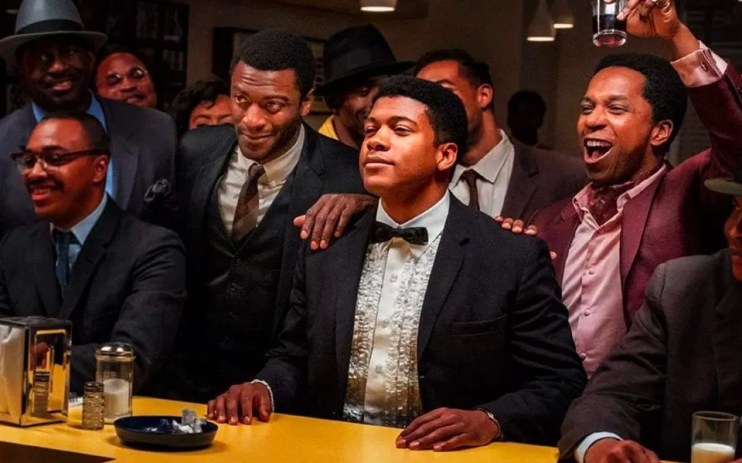One Night In Miami – Muhammad Ali fiction shines a powerful light

Based on the Kemp Powers play of the same name, Amazon’s One Night In Miami, a big hope for the 2021 awards season, is centred on the real life meeting of four African-American icons in the hours after Muhammad Ali’s (Eli Goree) 1964 title victory over Sonny Liston.
Instead of partying, Ali met with friends Sam Cooke (Leslie Odom Jr.), Jim Brown (Aldis Hodge), and Malcolm X (Kingsley Ben-Adir) in a small hotel room after the fight.
While the meeting is real, the story creates a fictional idea of what the four men might have talked about. Each individual was at a turning point in their lives: Malcolm X was drawing both adulation and death threats for his passionate Civil Rights leadership; Brown was on the verge of leaving the NFL for Hollywood; Cooke was topping the pop charts; and Ali (still fighting as Cassius Clay) was on the cusp of sporting immortality. These four figures with a lot on their shoulders joke, argue, and assess their impact on society.
The film is directed by Regina King, the Oscar winning actor know for her recent performances in If Beale Street Could Talk and TV show Watchmen. She has chosen a complicated subject for her debut feature but executes it brilliantly, giving a sense of intimacy to the evening and, despite the lack of locations, she keeps things visually interesting.
The spectre of racism is felt through both subtle references (two shadows waiting by Malcolm X’s car) and in gut-wrenching jabs. In particular, Brown’s early meeting with a supposed fan (Don Johnson) ends with a frighteningly abrupt turn, reminding you of the hostility that is always around the corner.
As gripping as the story becomes, the film’s stage roots can sometimes be stifling. Powers’ dialogue is very direct and plot-driven, sticking to the broader topics rather than scaling back and giving us an idea of the men behind the reputations. It’s a small complaint, as the exchanges are always engaging, but adds a level of theatricality to what is presented as an off-guard moment.
While the script may not be as revealing, the performances are fully realised. Much of the film’s conflict rises from each man’s relationship with their community. Much of the conflict comes from Ben-Adir’s Malcolm X and his interactions with his friends. A man whose beliefs have no downtime, he scrutinises them and encourages them to be more involvement in the struggle for racial equality, with the rest of the group reacting in different ways.
Most interesting is the rift felt between Malcolm X and Cooke, as the former lambasts him for only being interested in money. Odom’s Cooke bristles at what he sees as a holier than thou attitude of the activist. “Everything’s not so black and white like you make it out to be” he retorts, arguing that the fame and fortune Malcolm derides are also relied upon to bring attention to his campaigning. He wants, as he puts it, “the whole damn pie” of The American Dream, but the sense that he has been too quiet on the subject of racism hits a raw nerve.
It’s a complicated argument with no right or wrong, just two friends who have chosen different ways to survive in an unjust system. Ben-Adir is electric as Malcolm X, almost hunched with the weight of history and a sense that he has to achieve a lot in a short amount of time (the meeting in question happens just over a year before his assassination, aged just 39). Despite the disagreements, Ben-Adir gets across the importance of the message: “This movement that we are in is called The Struggle. Because we are fighting for our lives!”
The way each man changes the tone of their voice, shifts in their stance, or simply looks to the side will offer a novel’s worth of personal pain. Goree arguably has the hardest job as Ali, given that his character is so well known even in this prestigious company. The Canadian actor, who previously starred as Jesse Owens in biopic Race, avoids doing an impression and instead gives us a sense of the athlete both in front of the cameras and in private. As Brown, Hodge presents a middle ground as things deteriorate between Malcolm X and Cooke.
King takes us away from the hotel room for a handful of scenes, and adds spectacle to complement the fine acting. The noisy crowds loom in over Goree in recreations of Ali’s fights, while there’s one glorious flashback as Malcolm X recalls going to see Cooke at one of his shows. While the main plot’s one-room setting can be stifling, these moments give a glimpse of the electricity these men possessed in front of a crowd, and show that King is a filmmaker capable of spectacle.
One Night In Miami is best viewed as a portrait of history rather than a document. King and the talented cast capture what this quartet meant to people, rather than who they were, but when it all comes together so gracefully all you can do is sit back and enjoy.
One Night In Miami is available on Amazon Prime Video from Friday.